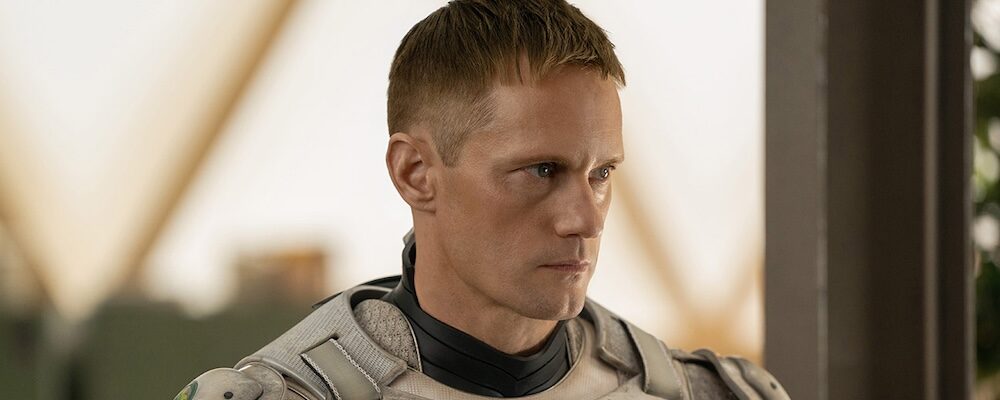Alexander Skarsgård Is a ‘Murderbot’ in Offbeat Sci-Fi Android Parable
Alci Rengifo
The rapid rise of AI is making android sci-fi even more relevant. In Apple TV+’s “Murderbot,” Alexander Skarsgård gives a performance almost diabolical in its observant coldness. His character is a cyborg which attains a form of self-awareness that doesn’t lead it to seek global conquest. The machine instead finds boredom in realizing human beings are kind of stupid. It’s a darkly funny twist that makes Skarsgård’s delivery all the more challenging. He has to keep us engaged considering his surroundings are not. This is not the gamble it sounds like for Apple TV, a streamer specializing in the somberness of existence.
Co-creators Chris and Paul Weitz base the series on the “Murderbot Diaries” novel series by Martha Wells. Gazing around at the rapaciousness of humans even as we have started colonizing space, No 238776431(Skarsgård), a SecUnit model, is about to be decommissioned by the Company. Like most futuristic corporate tyrannies, the Company rents out SecUnits to human clients for protection. This model manages to hack itself and break free from its submissive programming, renaming itself Murderbot. It protects its freedom by still pretending to be a dutiful robot servant. In reality, Murderbot is discovering the joys of being lazy and spends its time watching a soap opera, “The Rise and Fall of Sanctuary Moon.” The Company then assigns him new human clients to protect, a research team of scientists, named PreservationAux, who are stationed on an unexplored planet. They are Dr. Ayda Mensah (Noma Dumezweni), geologist Bharadwaj (Tamara Podemski), Arada (Tattiawna Jones), her wife, Pin-Lee (Sabrina Wu), Ratthi (Akshay Khanna), and Gurathin (David Dastmalchian), a human with enhanced qualities.
From then on, we basically get to lazy about with the Murderbot as it observes its new human owners while being careful to keep its autonomy secret. Chris and Paul Weitz delight in letting Murderbot narrate the story with prickly humor. It initially dismisses its new companions as “hippie scientists” and complains to us about how humans are so stupid in the ways they can get themselves killed. The scientists assure it they’re not comfortable with having a cyborg under their command, but it’s the only way to secure insurance for their mission. When Murderbot carries out an action on its own to save the crew, while facing the planet’s local, giant critters that look borrowed from “Dune,” suspicions begin to emerge. Gurathin is the first to start drawing conclusions. As this intrigue builds, a lot of the narrative first basks in light absurdism. The scientists try to make Murdebrot their buddy. It gets perks like a matching uniform with the humans and doesn’t need to stay in the cargo hold. All the while, it keeps complaining about the “stupid humans” to us, the viewers in on its secret. Sometimes to get by, Murderbot borrows lines from his favorite soap, and the scientists are none the wiser. Besides, the planet itself is such a barren, boring sight.
“Murderbot” may seem thin on plot, mostly because the true focus is the idea of what it would be like to observe ourselves from another entity’s vantage point. It is a concept similar to a question Noam Chomsky used to pose to readers in his books, asking them to imagine what aliens would think of us if they closely observed life on Earth. Murderbot thinks itself superior because he’s such an endless fountain of data, knowing he could kill the humans but decides not to. Yes, but what makes the scientists, and us, human is precisely our follies. We are reckless and clueless, needing to learn from experience instead of downloading it. When Murderbot saves Bharadwaj she gets injured, its own damage can be easily repaired while hers cannot. Yet, if it chose such an act of self-sacrifice, does that make Murderbot more human? Viewers who like science fiction will enjoy that kind of dilemma more than formula plotting.
Alexander Skarsgård in a sense has been preparing enough for this role in previous shows and films. There’s a natural iciness to his demeanor as in “The Northman,” where he played a savage Viking warrior. He can also be funny, like his uncensored tech CEO in “Succession.” In “Murderbot,” he has to channel both strains. Physically the character can obviously endure more than the scientists. It’s also stuck on this planet with them. Any of their mistakes put it in danger too. It also learns the common peril of being stuck in an office environment of being asked to give a speech at one point. Maybe such mundane tortures will eventually bond us closer to the machines in the future, when even robots can’t escape them.
“Murderbot” season one begins streaming May 16 with new episodes premiering Fridays on Apple TV+.

